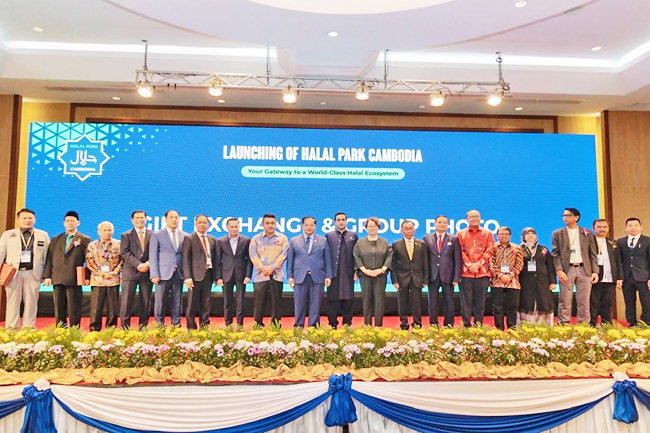PHNOM PENH (BERNAMA) – Cambodia is emulating its ASEAN counterparts to establish a smart halal park to seize the surging demand for halal food, services and products – boasting a multi-trillion dollar global market.
The phenomenal growth is fuelled by increasing desire for hygienic food, evolving dietary preferences, and demographic shifts reshaping the global halal food market.
The private sector-led Halal Park Cambodia project will place the Kingdom among other key regional players – Malaysia, Thailand, and Indonesia – currently dominating the market.
Halal Park Cambodia chairman and founder Mohd Amin Mohd Zain said the initial focus is to establish a multi-level satellite halal central kitchen and dedicated halal zones within the small- and medium-enterprises (SMEs) cluster by collaborating with WorldBridge Group of Companies.
“This initiative aims to facilitate the development of a robust halal supply chain for local SMEs, while also attracting international businesses to invest in Cambodia’s burgeoning halal market.
“By fostering this growth, we intend to bolster the halal industry both locally and globally,” said Mohd Amin at the launch in Phnom Penh on Saturday.

WorldBridge is a Cambodian conglomerate with diversified interests, including hotels, logistics, food and beverage, and real estate.
Rising awareness of halal and better disposal income are driving the nascent domestic market, which is home to over two per cent of the 16 million people, who belong to the Muslim faith in Cambodia.
The Organisation of Islamic Cooperation’s subsidiary, Statistical, Economic and Social Research and Training Centre for Islamic Countries, reported that the halal industry market size was USD3.7 trillion in 2020 and projected to swell to USD4.7 trillion this year.
Local demand is mostly centred around halal food and cosmetics.
Cambodian Senior Minister in charge of Special Mission Datuk Dr Othsman Hassan said the government’s commitment was seen in the establishment of an inter-ministerial committee this year to promote the sector for domestic and export markets.
“Cambodia is using the special economic zone framework to define strategies to promote the production and export of halal industry products to the world market.
“It demonstrates the Government’s willingness to provide incentives, tax relief, and investment facilitation.
“Through the launch of Halal Park Cambodia, I firmly believe that the private sector, both local and foreign, will continue to cooperate for the growth and prosperity of our people, especially Muslims who necessarily need halal food in their daily life,” said Othsman.
A Special Economic Zone planned on a 267-hectare land near the Funan Canal in Kandal Province, will be designated as a modern halal park.
“Halal Park in the free trade zone (FTZ) will enjoy special incentives, an open door policy, trademarks protection, no capital control and this is a dollarised economy.
“Halal Park is not only about manufacturing, it is about empowering the people, they are an asset to our community. We need technologies, food experts and scientists to develop the park. It encompasses social aspects as well as business aspects,” said Halal Strategic Development Director Alfien Lizan Khan.



















































